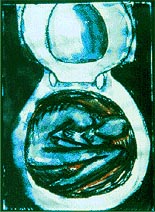Bulimia nervosa can become a nightmare. It is very painful to realize that you are losing control over yourself, over the quantity and quality of food that you greedily eat, when you just can’t reach the feeling of satiety. Dose by dose, portion by portion the bulimic is gobbling food with a complete realization that it’s wrong. The person with bulimia nervosa is not capable to concentrated on work, he can’t think of private life as all his thoughts are focused on meal. He will eat until he fells pain in his stomach, then he can cause vomiting and repeat this nightmare over again…
One girl with bulimia nervosa was afraid even to come back home, while nobody was there. If it happened, she immediately went to the refrigerator with a fair intention to make a family dinner. And unintentionally ate everything that was there inside. Then she ran to the shop to buy more products hoping to be in time before her husband. And again ate everything that has just bought. If there was money left the trip to the shop repeated; if there was no money she just sat and cried thinking in horror that she left her family hungry… She understood everything, she was tormented with shame, but she couldn’t help it. She almost gave up.
But I say, never give up! Bulimia nervosa can be effectively treated and even finally cured. Drug and psychological therapy can reduce the number of bulimic episodes to 2-3 a month and eventually eliminate them. There are no dead cases. You just must believe in yourself and feel the strength that you have buried with your fork and spoon. As it is still there!
One girl with bulimia nervosa was afraid even to come back home, while nobody was there. If it happened, she immediately went to the refrigerator with a fair intention to make a family dinner. And unintentionally ate everything that was there inside. Then she ran to the shop to buy more products hoping to be in time before her husband. And again ate everything that has just bought. If there was money left the trip to the shop repeated; if there was no money she just sat and cried thinking in horror that she left her family hungry… She understood everything, she was tormented with shame, but she couldn’t help it. She almost gave up.
But I say, never give up! Bulimia nervosa can be effectively treated and even finally cured. Drug and psychological therapy can reduce the number of bulimic episodes to 2-3 a month and eventually eliminate them. There are no dead cases. You just must believe in yourself and feel the strength that you have buried with your fork and spoon. As it is still there!
